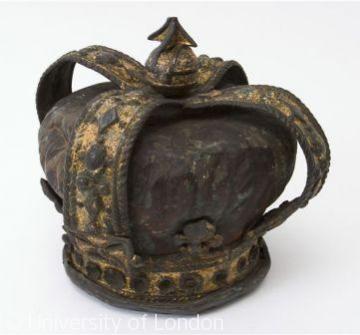Billo Crown and Bristol - The Huguenots

This brass crown dating from the early 1700's, was probably used as a ceremonial piece for trades processions in Bristol. It was made by Francis Billo, who was thought to be a Bristol Huguenot. The Huguenots were French Protestant refugees who fled from France from the 1680's to escape oppression by the French authorities who wished to force them to convert to Catholicism. Bristol welcomed some 400 Huguenots.Billo later went on to become well known in the West Country for his metal chandeliers. Another Huguenot refugee who came to Bristol and then went to America was Solomon Egare who became a renowned silversmith. Most Huguenots were mariners or weavers and some, like Billo, skilled metal workers. However, when they first arrived from France, having been smuggled out on illegal boats, many Huguenots were exhausted and often penniless and unable to speak English. Some, unable to find work, camped out in Bristol's streets, but sympathetic residents (including Quakers and some Anglicans) raised funds for them and they eventually found their feet or emigrated to London, Ireland or America.A few of these Huguenots, came from wealthy merchant families from La Rochelle and other French Atlantic ports (these includes families included the Peloquins, the Laroche and the Goizin families). Their trading contacts in America with other Huguenot and Dutch merchants ensured they quickly established themselves in the Atlantic economy and contributed substantially to the city's prosperity. The nature of the economy in the early eighteenth century meant much of their trade involved slave-produced goods and sometimes enslaved Africans themselves.
Content generated during research for the paperback book 'Bristol: Ethnic Monorities and the City 1000-2001' (ISBN 13 : 978-1-86077-477-5 ) for the England's Past for Everyone series



